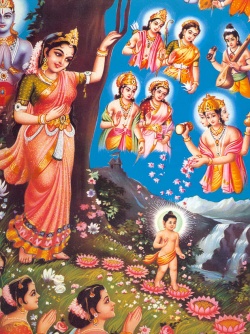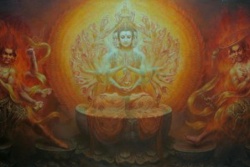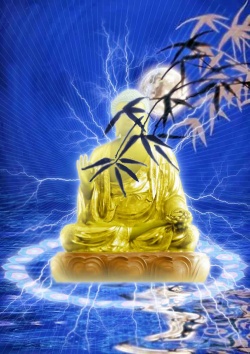Liberation
liberation (jie-tuo) or the release from worldly cares (samsara) is another term for enlightenment that means being free from samsara or the cycle of birth and death (reincarnation).
There is that dimension where there is neither earth, nor water, nor Fire, nor wind; neither dimension of the infinitude of space, nor dimension of the infinitude of Consciousness, nor dimension of nothingness, nor dimension of neither Perception nor non-Perception;
neither this World, nor the next World, nor sun, nor moon. And there, I say, there is neither coming, nor going, nor stasis; neither passing away nor arising: without stance, without foundation, without support (mental object). This, just this, is the end of stress.
— Ud 8.1
Where water, earth, Fire, and wind have no footing:
There the stars do not shine, the sun is not visible, the moon does not appear, darkness is not found.
And when a sage, a worthy one, through sagacity has known (this) for himself, then from Form and formless, from pleasure and pain, he is freed.
— Ud 1.10
Aggivessana Vacchagotta: 'But, Venerable Gotama the Monk whose mind is thus released: Where does he reappear?'
Buddha: '"Reappear," Vaccha, doesn't apply.'
'In that case, Venerable Gotama, he does not reappear.'
'"Does not reappear," Vaccha, doesn't apply.'
'...both does and does not reappear.'
'...doesn't apply.'
'...Neither does nor does not reappear.'
'...doesn't apply.'...
'At this point, Venerable Gotama, I am befuddled; at this point, confused. The modicum of clarity coming to me from your earlier conversation is now obscured.'
'Of course you're befuddled, Vaccha. Of course you're confused.
Deep, Vaccha, is this phenomenon, hard to see, hard to realize, tranquil, refined, beyond the scope of conjecture, subtle, to-be-experienced by the wise.
For those with other views, other satisfactions, other aims, other teachers, it is difficult to know.
That being the case, I will now put some questions to you. Answer as you see fit.
What do you think, Vaccha: If a Fire were burning in front of you, would you know that, "This Fire is burning in front of me"?'
'...yes...'
'And suppose someone were to ask you, Vaccha, "This Fire burning in front of you, dependent on what is it burning?" Thus asked, how would you reply?'
'...I would reply, "This Fire burning in front of me is burning dependent on grass and timber as its sustenance."'
'If the Fire burning in front of you were to go out, would you know that, "This Fire burning in front of me has gone out"?'
'...yes...'
'And suppose someone were to ask you, "This Fire that has gone out in front of you, in which direction from here has it gone? East? West? North? Or south?" Thus asked, how would you reply?'
'That doesn't apply, Venerable Gotama. Any Fire burning dependent on a sustenance of grass and timber, being unnourished — from having consumed that sustenance and not being offered any other — is classified simply as "out."'
'Even so, Vaccha, any physical Form by which one describing the Tathagata would describe him:
That the Tathagata has abandoned, its root destroyed, made like a palmyra stump, deprived of the conditions of development, not destined for future arising.
Freed from the classification of Form, Vaccha, the Tathagata is deep, boundless, hard-to-fathom, like the sea. "Reappears" does not apply. "Does not reappear" does not apply. "Both does and does not reappear" does not apply. "Neither reappears nor does not reappear" does not apply.
'Any feeling... Any Perception... Any mental fabrication...
'Any [act of] Consciousness by which one describing the Tathagata would describe him: That the Tathagata has abandoned... Freed from the classification of Consciousness, Vaccha, the Tathagata is deep, boundless, hard-to-fathom, like the sea.'
Liberation (Skt. mokṣa, Wyl. thar pa, Tib. ཐར་པ་) usually means freedom from samsara, either by attaining the state of an arhat or the state of perfect enlightenment of a buddha.
It can also occasionally have the meaning of performing the action of liberation, a practice to liberate the consciousness of a malignant being into a buddha field.[1]
Footnotes
- ↑ From the glossary in The Words of My Perfect Teacher, by Patrul Rinpoche. Translated by Padmakara Translation Group, Published by Harper Collins, ISBN 0-06-066449-5.
See Also
- Four gateways to liberation
- Three gateways to liberation
- Quotations: Liberation Depends upon Yourself
- Quotations: Sutra of Individual Liberation




